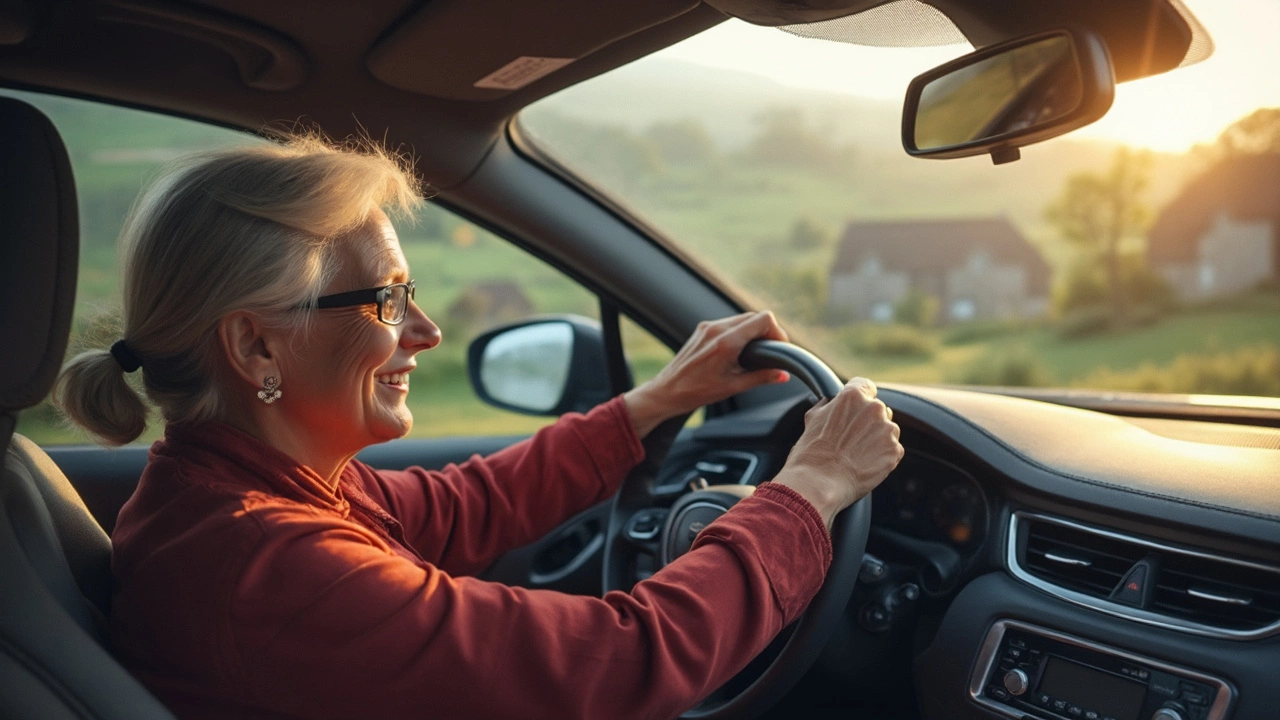So, you're thinking about learning to drive, but you're not exactly in your teens or twenties anymore. Guess what? That's totally okay! You might be surprised to find out that there's really no 'too late' when it comes to getting behind the wheel. In fact, lots of folks start driving later in life for all sorts of reasons—whether it's the freedom of not depending on others or just checking off a bucket list item.
Let's dig into why age doesn't have to be a roadblock. For starters, your life experience can actually be a big plus. You've got the patience of someone who's been around for a while, likely more discipline, and let's be honest, the desire to pass your test so you don't have to take it again is a real motivation boost.
- Why Age is Just a Number
- The Benefits of Learning to Drive Later
- Challenges Older Beginners Face
- Tips for Older First-Time Drivers
- Dispelling Myths About Late Driving Learners
- Boosting Confidence for Mature Learners
Why Age is Just a Number
Ever feel like you've missed the boat because you're past your twenties or thirties and still don't have a driver's license? Toss that thought aside. Honestly, when it comes to learning how to drive, your age really doesn't matter as much as you might think.
Here's a kicker: Studies show that mature learners, those picking up new skills later in life, often catch on faster because they bring a unique focus and determination. With more life experience under your belt, decision-making becomes sharper, risk assessment is much better, and let's not forget the patience you probably now have compared to your younger self.
Consider this: According to the National Highway Traffic Safety Administration, adults over 25 have been steadily increasing in driver's education courses over the past decade. This trend suggests that many adults realize the benefits of learning to drive at any age, whether it's for work, leisure, or sheer independence.
Plus, as hosts of people dive into new experiences later in life, it can help boost brain health by keeping things fresh and engaging. So, whether you're looking at driving lessons at 30, 40, 50, or beyond, it's all about keeping your mind sharp, your skills relevant, and your heart open for new adventures.
Sure, there are some age-related hurdles, but let's be real. With today's technology and better car designs tailored for comfort and ease of use, learning to drive is more accessible than ever. Technologies like adaptive cruise control, parking assist, and more can be huge helpers regardless of when you start.
The Benefits of Learning to Drive Later
Learning to drive when you're a bit older definitely has its perks. One biggie is the level of maturity you bring to the table. You've probably navigated challenging situations, making you calmer and more focused, which is gold on the road. Being older might mean you take safety more seriously, which can be reflected in more responsible driving habits.
Another win is how it can broaden your horizons. Maybe you've relied on public transport or carpools your whole life—getting your driving license suddenly opens up spontaneous travel options, and you no longer have to align your plans with bus schedules. Think of the spontaneous road trips you could take!
From a social angle, driving later in life can enhance your personal and professional connections. Whether you're able to drive your grandchildren around or finally attend distant job opportunities, the independence is a total game-changer.
Plus, let's not forget the mental workout involved. Learning new skills is a great way to keep your mind sharp. Mastering driving lessons and gaining the knowledge to learn to drive can be incredibly fulfilling and give your brain a fresh challenge.
Some folks even feel they appreciate driving more because they started later. There's a sense of achievement and empowerment that comes with passing your driving test at an older age—an inspiring reminder that you're never too old to take on new adventures.
Challenges Older Beginners Face
Learning to drive when you're older does come with its unique hurdles. Let's dive into the specifics so you know what to expect and how to tackle them. First, there’s the whole physical side of things. Reaction times might not be as quick as they used to be, and vision or hearing might not be as sharp. But hey, modern cars come packed with nifty technology like parking sensors and lane assist that have your back.
You might also face the mental aspect – the good old fear of failure. It's a big one for adults who aren't used to being the newbie anymore. Just remember, every expert driver started where you are now. The key is practice and patience. Plus, the driving instructors of today are more than equipped to guide adult learners with techniques that gently ease you into the process.
Then there's the juggle of life itself. Finding time for lessons might be tougher with a job, family, or other commitments. However, many driving schools offer flexible schedules, including evenings and weekends, to fit your calendar. Prioritizing some 'you' time to learn this skill is entirely worth it.
- Learn to drive at your own pace. There's no rush to pass your test; take it as slow or as fast as you need.
- Practice mindfulness to manage stress and keep anxiety levels down.
- Communicate openly with your instructor about any nerves or concerns.
According to a study in 2024, drivers over the age of 40 accounted for 30% of new learners, proving it's more common than you might think. So, while there are challenges, the benefits of hitting the open road whenever you want are right at your fingertips.

Tips for Older First-Time Drivers
Thinking about hitting the road later in life? No worries, you've got this! Here’s what you need to know to become a confident driver, no matter your age.
First off, consider taking a few driving lessons with a local, experienced instructor. They'll understand the typical hurdles first-time drivers encounter and can provide tips tailored just for you.
You might think that learning at a more mature age means being slower at picking things up, but that's not necessarily true. You can actually turn your maturity into an advantage. Here’s how:
- Stay Calm Under Pressure: With age comes patience. Use this to your advantage when dealing with stressful situations on the road.
- Set a Flexible Schedule: Avoid rush hour traffic during your initial practice sessions. Instead, choose quieter times when you can focus without the chaos.
- Practice Regularly: Just like any new skill, regular practice is key. Short, consistent sessions are often more effective than cramming lessons into a single day.
- Use Technology: GPS apps can help you navigate confidently. Plus, plenty of apps focus on driving theory tests that can brush up your knowledge.
- Ask for Feedback: Don't hesitate to ask for feedback from your instructor or co-pilot. Constructive criticism is your friend when you're learning something new.
If you’re curious about how age affects learning to drive, check this out:
| Age Group | Likelihood of Passing Test First Time |
|---|---|
| 18-24 | 49% |
| 25-34 | 47% |
| 35-44 | 45% |
| 45-54 | 43% |
| 55+ | 41% |
These stats remind us it's totally normal for older learners to take a little longer, so don’t sweat it if you don’t ace the test first time. The road is there for all of us, regardless of when we choose to start exploring it.
Dispelling Myths About Late Driving Learners
There's a bunch of myths floating around when it comes to learning how to drive later in life. Let's clear the air on some of these misconceptions!
First up, there's this idea that older folks can't pick up new skills as easily as younger people. Truth is, while it might take a bit longer to grasp the basics, late driving learners often bring a more cautious and thoughtful approach to the table. They tend to be more aware of road risks than their younger counterparts, which can make them safer drivers overall.
Another common myth is that insurance premiums skyrocket for older newbies. While age can play a role in determining rates, they're more influenced by your driving history and the type of car you drive. Plus, many insurance companies offer discounts for taking defensive driving courses, which can help keep those costs down.
Some people think that learning to drive later means missing out on the fun of youthful road trips. But let's be real—road trips are awesome at any age, and starting a new chapter behind the wheel can bring just as much excitement as it does in your twenties.
There's also the misconception that driving schools won't cater to older learners. Many instructors actually appreciate teaching older students because they are usually motivated and committed. Plus, driving lessons tailored for mature learners are becoming more popular, offering paced learning and support.
So, if you've been on the fence about hitting the books (or in this case, the roads), it's time to push those myths aside. Embrace the journey, and remember that starting your driving adventure later in life can be just as rewarding.
Boosting Confidence for Mature Learners
Feeling a bit nervous about slipping into the driver's seat? That's pretty normal, especially if it's your first time learning to drive later in life. The good news is there are ways to build your confidence and tackle any doubts you might have.
First off, practice makes perfect. Regular driving lessons with a patient instructor can work wonders. Set a schedule that suits your pace. This consistent routine helps you become familiar with the vehicle and builds muscle memory, which is super important when you're learning to drive.
Another tip? Create a checklist of driving scenarios you feel uneasy about. Things like parallel parking or navigating busy intersections can seem less daunting when tackled one at a time. Ask your instructor to focus on these areas until you're comfortable.
Don't underestimate the power of small victories. Celebrate each milestone, whether it's mastering a tricky maneuver or feeling less anxious at the wheel. These achievements gradually boost your confidence.
Learning to drive isn't just about skills; it's also about mindset. Concentrate on positive self-talk—remind yourself that you're a capable learner, regardless of age. Sometimes, watching videos or reading up on driving tips online can give you that extra push of motivation. Just make sure these resources are trustworthy!
If nerves still get the best of you, think about taking a defensive driving course. Not only does it equip you with extra skills, but it also reassures you about managing tough road situations. Plus, sometimes insurers offer discounts if you've completed one.
Finally, consider the support of a buddy system. Practicing with someone you trust can ease tension and provide constructive feedback. It's all about building a supportive learning environment. Besides, having a partner in crime can make the journey to learning to drive much more fun!

